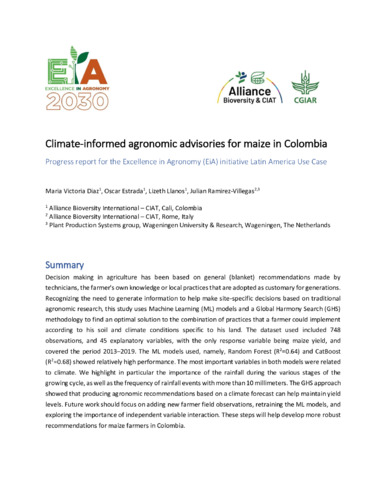Climate-informed agronomic advisories for maize in Colombia: Progress report for the Excellence in Agronomy (EiA) initiative Latin America Use Case
Decision making in agriculture has been based on general (blanket) recommendations made by technicians, the farmer's own knowledge or local practices that are adopted as customary for generations. Recognizing the need to generate information to help make site-specific decisions based on traditional agronomic research, this study uses Machine Learning (ML) models and a Global Harmony Search (GHS) methodology to find an optimal solution to the combination of practices that a farmer could implement according to his soil and climate conditions specific to his land. The dataset used included 748 observations, and 45 explanatory variables, with the only response variable being maize yield, and covered the period 2013–2019. The ML models used, namely, Random Forest (R2=0.64) and CatBoost (R2=0.68) showed relatively high performance. The most important variables in both models were related to climate. We highlight in particular the importance of the rainfall during the various stages of the growing cycle, as well as the frequency of rainfall events with more than 10 millimeters. The GHS approach showed that producing agronomic recommendations based on a climate forecast can help maintain yield levels. Future work should focus on adding new farmer field observations, retraining the ML models, and exploring the importance of independent variable interaction. These steps will help develop more robust recommendations for maize farmers in Colombia.

